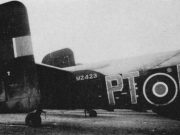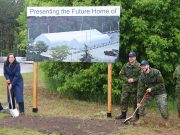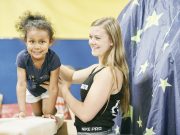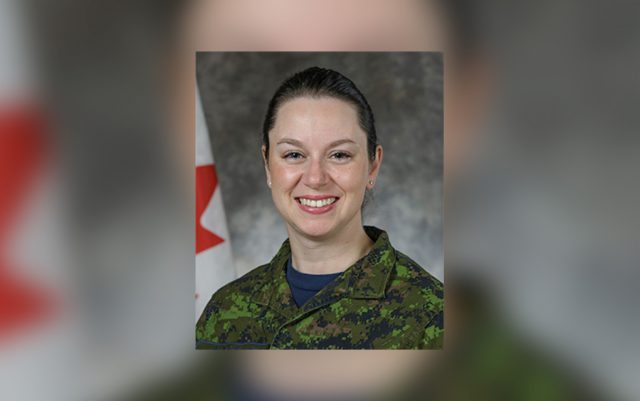Commanding Officer, 17 Mission Support Squadron, 18 Wing Winnipeg
LCol Amanda Aldous joined the RCAF as a Logistics Officer, and specialized in Human Resources. Her love for organizing, planning, and working with people made the profession seem like a good fit – she could help people on their best day and their worst day.
“As logisticians, we’re enablers – the mission does not happen without logistics,” she says. “It doesn’t always seem like the coolest work, but every single person in my squadron can draw a direct line between their work and air operations. They’re a humble group and don’t seek praise, but really, they are making magic happen every day to support the mission and enable success.”
She adds that the COVID-19 pandemic has given logisticians an opportunity to demonstrate their full potential.
“It’s a great time to be a logistician,” she says eagerly. “The pandemic has highlighted how critical our work is… In the past three months, 17 MSS has been providing support to Op LASER and Northern Manitoba communities – we’re on our sixth community now that we’ve been supporting with 435 Squadron and CFB Shilo in a very joint effort… and we’re doing that concurrently with keeping the Wing running, and providing support to all the units in the Winnipeg area of responsibility. I’ve been really impressed with what my squadron has been able to do.”
Leading a squadron during the pandemic has been a significant challenge, one LCol Aldous notes is being shared by leaders everywhere.
“It’s really tough to be in command during COVID,” she acknowledges. “A lot of the folks in my squadron are essential workers, so they’re feeding the base, they’re putting fuel in aircraft, we’re keeping the Wing functioning.. In a time where people are isolated, and meetings are happening virtually, we can’t even get together for a morale activity or do PT together… the solution is really to empower our leaders, down to the Sgt/MCpl level, to check on the folks in their sections, to be kind. Doing those buddy checks in all directions –up, down and across the chain of command -, because this is a very isolating time.”
While reflecting on these challenges, LCol Aldous attributes a lot of her success in command – in addition to professional competence and being able to ‘speak operator’ – to her own lived experience. As a woman who attended an all-girls high school in Winnipeg, her background does not resemble that of most of her fellow officers; acknowledging that difference and making it authentically her own has paid dividends.
“That’s something we talk about, from a leadership perspective – if you’re not authentic and credible, your troops will see through that really quickly,” LCol Aldous says. “I had to create some space for myself to do it my way, and I think some of those attributes that made me feel like a bit of an outsider at the beginning of my career – emotional intelligence and compassion – have enabled me to have a firm but fair leadership style that has been a real asset in command.”
LCol Aldous notes that her experience in the RCLS has helped her develop that personal style. Women make up roughly 40% of the service, and have long occupied leadership positions at all levels. Currently, the vast majority of Mission Support Squadrons are commanded by women, something she feels honoured to be part of.
“This has been incredibly special for me,” she says. “These are women I’ve trained with and worked with over the years who have succeeded on their merit and hard work, and it makes me really proud to be one of them. We’re connected with each other, and we support each other, and we’re committed to being mentors for the women coming up through the ranks behind us.”
Ultimately, LCol Aldous hopes this same approach can be amplified beyond the RCLS, to benefit the CAF as a whole.
“When I was a Lieutenant in Shearwater, all my fellow Squadron Logistics Officers were women,” she notes. “My DCO was a woman, my CO was a woman, and I just thought that was normal. Now as a CO, I find I’m often in meetings where I am still the only woman.
“I think the RCLS has long acknowledged and celebrated what women bring to the table,” she adds. “And every time I interact with a junior officer or junior NCM, I’m blown away. The future is very bright with this next generation.”
Pleins feux sur la profession des armes : la lieutenant-colonel Amanda Aldous
Commandant, 17e Escadron de soutien de mission, 17e Escadre Winnipeg
La lieutenant-colonel (Lcol) Amanda Aldous s’est enrôlée dans l’ARC à titre d’officier de la logistique spécialisé en ressources humaines. Étant donné son amour de l’organisation, de la planification et du travail avec les gens, la profession semblait lui convenir – elle allait pouvoir aider les gens dans les meilleurs moments et dans les pires.
« En tant que logisticiens, nous sommes des facilitateurs – la mission ne peut pas être exécutée sans logistique, affirme-t-elle. Cela n’a peut-être pas l’air toujours très chouette comme travail, mais chaque personne au sein de mon escadron peut établir un rapport direct entre son travail et les opérations aériennes. C’est un groupe humble, qui ne recherche pas les louanges, mais vraiment, ils font de la magie tous les jours pour soutenir la mission et en assurer le succès. »
Elle ajoute que la pandémie de COVID-19 a donné aux logisticiens l’occasion de démontrer leur plein potentiel.
« C’est un bon moment pour les logisticiens, dit-elle avec enthousiasme. La pandémie a mis en évidence à quel point notre travail est crucial… Au cours des trois derniers mois, le 17 ESM a fourni du soutien à l’Op LASER et aux communautés du nord du Manitoba – nous en sommes maintenant à prêter assistance à une sixième communauté en étroite collaboration avec le 435e Escadron et la BFC Shilo… et nous faisons tout cela en continuant d’assurer le bon fonctionnement de l’Escadre et de soutenir toutes les unités dans la zone de responsabilité de la BFC Winnipeg. Je suis très impressionnée par ce que mon escadron a été capable d’accomplir. »
Diriger un escadron en temps de pandémie s’est avéré un important défi. Ce défi, fait remarquer la Lcol Aldous, est le même pour les dirigeants partout dans le monde.
« C’est vraiment difficile d’être aux commandes pendant la COVID-19, reconnaît-elle. Beaucoup de gens dans mon escadron sont des travailleurs essentiels, alors ils alimentent la base, ils mettent du carburant dans les avions, ils veillent à ce que l’Escadre continue de fonctionner… En cette période où les gens sont isolés et les réunions, virtuelles, nous ne pouvons même pas nous réunir pour faire une activité pour nous remonter le moral ou faire notre entraînement physique ensemble… La solution consiste véritablement à responsabiliser nos dirigeants, des échelons les plus élevés jusqu’aux grades de sgt/cplc, à s’assurer que tout le monde va bien dans leur section, à faire preuve de bienveillance. Il faut faire ces vérifications auprès de nos compagnons dans toutes les directions – du sommet à la base dans l’ensemble de la chaîne de commandement, parce que nous vivons une époque où tout le monde est isolé. »
En réfléchissant à ces défis, la Lcol Aldous attribue une grande partie de son succès comme commandant – en plus de sa compétence professionnelle et de sa capacité à « parler la langue des opérateurs » – à son expérience personnelle. En tant que femme ayant fréquenté une école secondaire pour filles à Winnipeg, son parcours ne ressemble en rien à celui de la plupart de ses collègues officiers. Le fait de reconnaître cette distinction et de se l’approprier a fini par porter ses fruits.
« C’est une question dont on discute entre dirigeants : si vous n’êtes pas authentique et crédible, vos troupes vont s’en apercevoir très rapidement, explique la Lcol Aldous. J’ai dû faire ma place pour pouvoir diriger à ma façon, et je pense que certaines des facettes de ma personnalité qui m’ont fait me sentir un peu à part des autres au début de ma carrière, comme l’intelligence émotionnelle et la compassion, m’ont donné les outils nécessaires pour exercer un leadership ferme mais juste qui s’est avéré un véritable atout dans le cadre de mes fonctions de commandement. »
La Lcol Aldous remarque que son expérience au SRLC l’a aidé à peaufiner son style de direction. Les femmes constituent environ 40 % du Service, et occupent depuis longtemps des postes de direction à tous les échelons. À l’heure actuelle, la vaste majorité des escadrons de soutien de mission sont commandés par des femmes et elle se sent privilégiée d’en faire partie.
« C’est très spécial pour moi, raconte-t-elle. Ce sont des femmes avec qui je me suis entraînée et avec qui j’ai travaillé au fil des ans qui ont réussi grâce à leur mérite et à leur travail acharné, et je suis remplie de fierté d’être l’une d’entre elles. Nous sommes liées les unes aux autres et nous nous soutenons mutuellement, et nous avons la volonté d’être des mentors pour les femmes qui gravissent les échelons derrière nous. »
Ultimement, la Lcol Aldous espère que cette même approche trouvera écho à l’extérieur du SRLC pour que l’ensemble des FAC puissent en bénéficier.
« Quand j’étais lieutenant à Shearwater, tous mes collègues officiers de la logistique au sein de l’escadron étaient des femmes, se souvient-elle. Mon commandant adjoint était une femme, mon commandant était une femme, et je pensais que c’était tout à fait normal. Maintenant que je suis moi-même commandant, je me rends compte qu’il arrive encore souvent que j’assiste à des réunions où je suis la seule femme autour de la table. »
« Je pense que le SRLC reconnaît et salue depuis longtemps ce que les femmes amènent à la table, ajoute-t-elle. Et chaque fois que j’interagis avec des officiers ou militaires du rang subalternes, je suis épatée. L’avenir est très prometteur grâce à la montée de cette nouvelle génération. »












